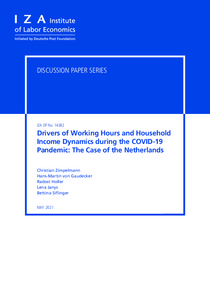Drivers of working hours and household Income dynamics during the COVID-19 pandemic: the case of the Netherlands

Zimpelmann, Christian ; von Gaudecker, Hans-Martin ; Holler, Radost ; Janys, Lena ; Siflinger, Bettina M.
Institute of Labor Economics, Bonn
IZA - Bonn
2021
epidemic disease ; working time ; telework ; essential service ; social inequality ; labour market
Discussion Papers
14382
Working time and leave
http://ftp.iza.org/dp14382.pdf
English
Bibliogr.
"Using customized panel data spanning the entire year of 2020, we analyze the dynamics of working hours and household income across different stages of the CoVid-19 pandemic. Similar to many other countries, during this period the Netherlands experienced a quick spread of the SARS-CoV-2 virus, adopted a set of fairly strict social distancing measures, gradually reopened, and imposed another lockdown to contain the second wave. We show that socio-economic status is strongly related to changes in working hours, especially when strict economic restrictions are in place. In contrast, household income is equally unaffected for all socio-economic groups. Examining the drivers of these observations, we find that pandemic-specific job characteristics (the ability to work from home and essential worker status) explain most of the socio-economic gradient in total working hours. Furthermore, household income is largely decoupled from shocks to working hours for employees. We provide suggestive evidence that large-scale labor hoarding schemes have helped insure employees against demand shocks to their employees."
Digital
The ETUI is co-funded by the European Union. Views and opinions expressed are however those of the author(s) only and do not necessarily reflect those of the European Union or the ETUI.